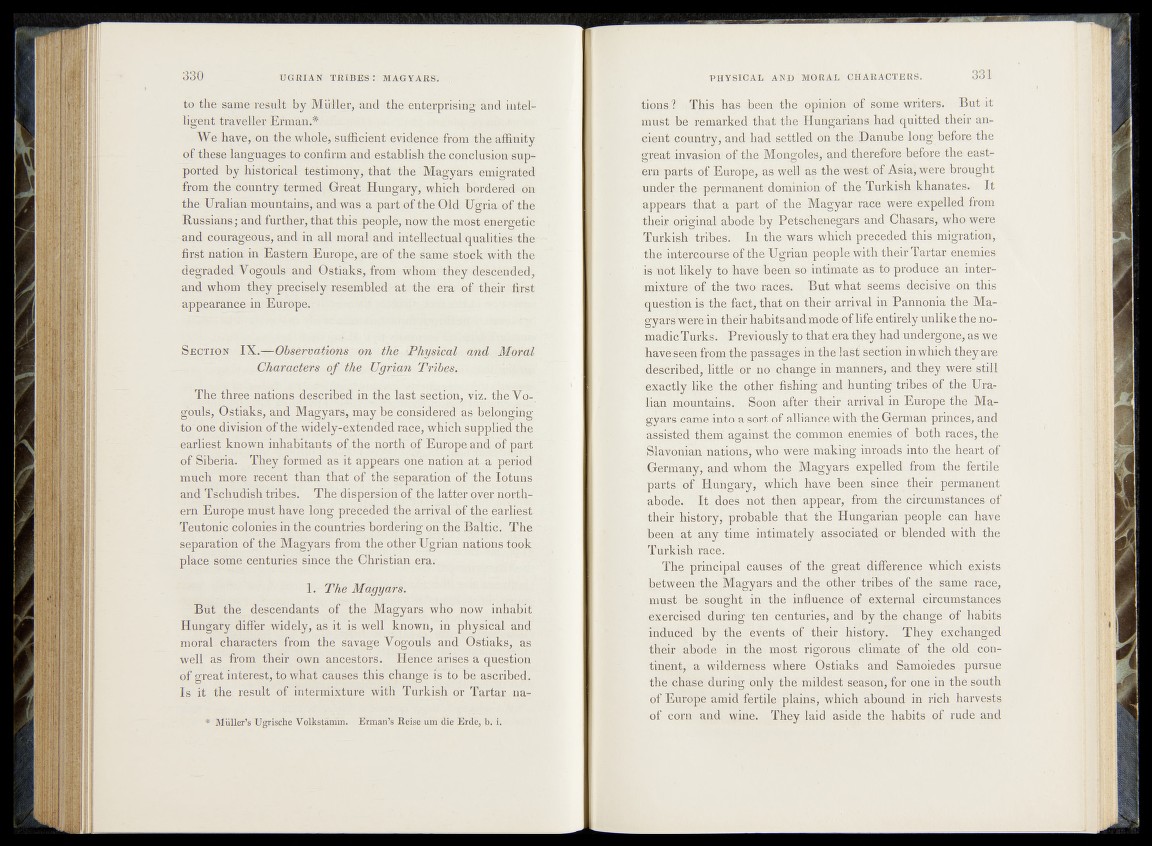
to the same result by Mull errand the enterprising and intelligent
traveller Er man. *
We have,.on the whol^suffieient .evidence from tb®affinity
of these languages to confirm and estaWish-fhe conclusion sup+
ported by historical testimony, that, the Magyars emigrated
from the country termed Great Hungary, whic-h ^bbrdered on
the Uralian mountains, and was a parriof theOld Ugria;of the
Russians;.f;nd further, that this people, now the mo^fcenergetic
and courageous, andi in all moral and intellectual qfiali'tlbgSithe'
first nation in Eastern Europe, are ofithe -sameotock with the
degraded Vogoids and Ostiaks, from whom they descended,
and whom they precisely resembled at the era of their tfi-rst
appearance in Europe. •
S e c t io n IX«— Observations on the 'Physical and Mural
Characters o f the Ugrign Tribes.
The three nations described in the last .section, viz, the v o-
gouls, Ostiaks, and Magyars, may be considered as-pelongmg
to'one division of the widely-extended race,- whiqnsupplied rim
earliest known inhabitants of.the horth of Europe and of part
of Siberia. They formed as it appears ,'pnê' nation at-a period
much more recéht than that o f'the separation of the Iotuns
and Tschudish tribes.' The dispersion of the latter over northern
Europe must have long preceded the arrival of the earliest
Teutonic colonies in the countries bordering on'the Baltic. The
separation o ff he Magyars from the other Ugrian nations took
place some centuries since the Christian era.
1. The Magyars.
But the descendants of the Magyars who now inhabit
Hungary differ widely, as it is well known, in physical and
moral characters from the savage Vogouls and Ostiaks, as
well as from their own ancestors. Hence arises a question
of great interest, to what Causes .this change is to be ascribed.
Is it the result of intermixture with Turkish of Tartar na-
Miiller’s Ugrische Volkstâmm. Ennan’s Beige um die Erde, bi i.
tio^s^A This >has heonrAbe opipion -of seine writers* But it
mU^t be remarked thn|%£' Hungarians^had- quitted their ani
e n t eountryR^^had6*§e%led>d|^|heyPanube long-before the
g r e a t - i i p y a s i h ; e Mongolfs> andft^er-efo4e. before th e east-
ern parts o f a f the^v/’e§t?of*Asiaf>j5V.ei,e brough|
-.under the-^p'ermane|^t4dQrnimion;®rf the jT u ik i^ khanates.,.. It
appears- that a »part' fo.fi racp^werri^^oellod from
thoiTiOpigi b$1> ab^dqrby Pets^^dgair^and',GHasars,: who were
Turkish tijp f r i In th e wars whio^fre.©ed4#iw^|migration,
theH^te^ou^^of the ®grfan^peqple withfheirTarta® enemies
is-mokfikel^to hav^been^bimtiipate- as 10pfodsk^/S a n |^ te r-
l&dxturej of,the;ttw>!.races.. B u tw h ^ t^ q e n ^ ^
■ q,u,^f ton’isdhe.fact, that o n ^ e it^ riv a k -in P annum a thejMa- -
5^a^>w;ei;e in th^ir habits a^d^mode q^lifi^entirel^nlikethe no-
madi^Turks. P re y jg u ^ to thgjjt^p tlifey.had u n d ^ g o n ^ s ^
have*seenrtfrpih^e&f imwlhclf they are
.deseribech lithle or nofcjkupjgedn manuef^!and'.theynv^efe.Jstdl
exactlyldferthe, other fishing and^huntihg^tribeSi^-the Ura-
lian n^JinM’ns.VjKoon'after,-fheir^arrival in Eur<Jfe(the Magyars
came into^aisort of alliani^with th e ( ||^ am p r in ^ |a and
- ftfepf againstfHe co^m^ik the
.Slavonian nations, wh° were^making i& p ^ s int<^thL^heg.,rt of-
Germany, and whop the, Magyars ,expeUpd>,frpui t te ferti|j|
/p hri^of Hungary, which. haveBpeffi^ sinj^da|heir, permanent
aMde*. It,, d'oe^not then appear, fro.m the-circumstances .c|f
their history, probable that the Hungaria^p^ogle, can ,hai§|
been at.any time intimately associatedyn* blended with the
Turkish fkce.
The principal causesfbf, the great difference which exists
between th e ^Magyars and thq jqtlier tribes., of the same 4 rapp,
must be sought in the influence of external circumstances
exercised during ten centuries,‘and' 'by the change of' habits
induced by the events of their "history. They" exchanged
their abode in the most rigprpus .climate, of '^ie .old continent^
a wilderness where Qstiaks and- Samoiedes*, pursue
the chase during only the mildest season, .for one in thevsouth
of Europe amid fertile, plains', which .abound in rich harvests
of corn and wine. They laid aside the habits of rude and